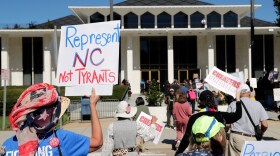With district boundaries decided for now, North Carolina candidates were welcomed into election offices on Thursday to file for this year's races. Others weighed their futures as another round of redistricting retooled the geographic and partisan makeup of seat boundaries.
The State Board of Elections and county election offices accepted candidate documents and fees again after filing was suspended for 2 1/2 months.
The resumption was affirmed only after the state Supreme Court on Wednesday night refused the appeals of those seeking to delay the use of congressional districts and state Senate districts that a panel of trial judges had endorsed earlier in the day. A state House map also approved by the three judges wasn't appealed and is now in use.
The filing restart also applied to candidates who don't run in districts. That includes Cheri Beasley, the Democratic front-runner for U.S. Senate who came to the State Fairgrounds in Raleigh with family and campaign staff to file her paperwork with the State Board of Elections.
The former chief justice of the state Supreme Court tried to focus on the future as she deflected questions about recent rulings by many of her Democratic former court colleagues. Three weeks ago, the justices struck down redistricting maps enacted by the GOP-controlled General Assembly in November by declaring them unconstitutional partisan gerrymanders favoring Republicans.
“We have heard the rulings of the courts, the decisions have been made, and we’re moving on,” Beasley told reporters. “It’s time to make sure that we’re traveling across the state, meeting North Carolinians, talking to them about the kinds of issues that they care deeply about.”
Beasley had not formally filed during the three days in December that filing was permitted for the then-March 8 primary. The Supreme Court suspended that process so that redistricting litigation could go to trial. The justices also delayed the primary until May 17, which is still scheduled.
Ultimately, the General Assembly approved replacement maps last week. The trial judges, with the recommendation of special experts they hired, upheld the legislative districts but retooled the congressional map extensively before adopting it for this year's elections.
The new U.S. House boundaries, likely in effect for the 2022 elections only, put Republicans in good shape to win seven of the 14 seats and Democrats six, according to political analysts. An open 13th District seat stretching from southern Wake County south into three fast-growing exurban counties is a likely toss-up.
Democrats currently hold five of the state's 13 U.S. House seats, so the map will be a likely improvement for their party. North Carolina gets a 14th seat starting in 2023 thanks to population growth.
Republican legislators had drawn a congressional map that created four competitive districts — yet which also could have given the GOP a 10-4 seat advantage in the right circumstances. In a legal filing late Wednesday, Republicans had suggested that the judges' plan were ripe for a challenge in federal courts. Republican legislators were silent early Thursday about what, if anything, they plan to do next.
For now, members of Congress and potential candidates made pronouncements about electoral intentions.
Five-term GOP Rep. Richard Hudson of Concord announced he would file to run in a reconfigured 9th District that leans Republican, rather than run in a new 12th District near his current home considered heavily Democratic. Hudson has previously represented most of the counties in the new 9th, including areas around Fort Bragg.
GOP Rep. Dan Bishop of Charlotte, who represents the current 9th District, said late Thursday that he would run in the new 8th District, which includes some south-central counties he currently represents.
In a tweet, Bishop said he wants “to keep fighting for freedom for those I have served before and new friends I have yet to meet.”
A decision also should be forthcoming from first-term Republican Rep. Madison Cawthorn of Henderson County, who filed for reelection in December for a proposed district that stretched from parts of Charlotte west to the foothills. But that district essentially no longer exists, and the 11th District he currently represents is more comfortably Republican than its previous iteration was.
Cawthorn, like other candidates already formally running, has until next Tuesday to withdraw as a candidate for a specific district. He could then file for another district seat by midday March 4, when the filing period closes. Congressional candidates don’t have to live in the district for which they are running.






